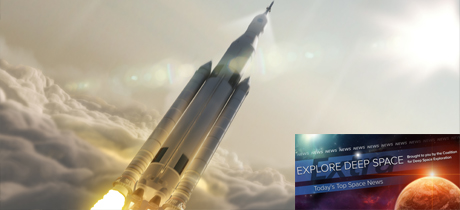In Today’s Deep Space Extra… Advances in human deep space exploration and space science require new U.S. heavy lift rocket capabilities, according to experts gathered this week for the 33rd annual Space Symposium in Colorado Springs.
Human Deep Space Exploration
Scientific advancement is going to require heavy lift, experts say
Space News (4/5): A U.S. heavy lift rocket capability is an essential part of furthering the human exploration of Mars and launching large telescopes designed to probe the mysteries of the universe, an expert panel explained during a presentation before the 33rd annual Space Symposium in Colorado Spring.
Op-ed | Assuring U.S. space competitiveness should be a national priority
Space News (4/5): A strong and competitive commercial space industry is vital to U.S. global leadership, writes David Melcher, president and CEO of the Aerospace Industries Association. “With new markets emerging for everything from Internet communications, remote sensing, satellite servicing, and transportation to space and manufacturing in space, we simply can’t afford to be left behind.”
Space Science
CNSA boss outlines China’s space exploration agenda
Space News (4/5): China intends to expand its space influence with a possible Mars sample return mission, missions to Jupiter and Venus, Earth science satellites and commercial initiatives, as well as a previously planned lunar sample return mission and assembly of an Earth orbiting space station, according to Yulong Tian, general secretary of the Chinese National Space Administration. He spoke before the 33rd annual Space Symposium in Colorado Springs.
Low Earth Orbit
Whitson’s Station expedition extended three months
Spaceflightnow.com (4/5): Poised to set a new U.S. record for career accumulated time in space later this month, NASA astronaut Peggy Whitson will extend her current mission aboard the International Space Station from early June to a date to be determined in September, the space agency announced late Wednesday.
Astronaut John Glenn to be interred at Arlington Cemetery
Associated Press via New York Times (4/5): Mercury astronaut John Glenn, who became the first American to orbit the Earth in 1962, died December 8, 2016 at 95. Glenn, a U.S. Marine Corps aviator, will be buried in Arlington National Cemetery in ceremonies Thursday. President Trump ordered that U.S. flags be lowered to half-staff in Glenn’s honor.
Russia open to extending international Space Station partnership
Reuters (4/4): Speaking at the 33rd annual Space Symposium in Colorado Springs, Russian Space Agency General Director Igor Komarov says Roscosmos is ready to discuss an extension of International Space Station operations beyond 2024, the current end date. An extension could help scientists address more of the health and technical challenges facing human deep space explorers, he said.
Russia’s cosmonauts training center plans to beef up recruitment
TASS of Russia (4/5): Russia will recruit more cosmonauts and is seeking applications from individuals beyond the military and aerospace industry, according to Yuri Lonchakov, who heads the country’s cosmonaut training center. The most recent previous recruitment was carried out in 2012.
SpaceX gaining substantial cost savings from reused Falcon 9
Space News (4/5): After the inaugural reuse of a Falcon 9 first stage last week for the launch of a commercial communications satellite, SpaceX reports the company sees future cost savings in hardware reuse, company president Gwynne Shotwell told an audience gathered for the 33rd annual Space Symposium in Colorado Springs on Wednesday.
Suborbital
Blue Origin still planning commercial suborbital flights in 2018
Space News (4/5): Blue Origin is continuing to strive for launches of paying suborbital passengers on its New Shepard rocket by the end of 2018, according to founder Jeff Bezos. Bezos discussed plans for crewed test flights and passenger excursions at the 33rd annual Space Symposium in Colorado Springs.
Virgin Galactic aiming for 1st spaceflight this year, Branson says
Space.com (4/5): Virgin Galactic founder Sir Richard Branson foresees the first suborbital test flight of the company’s piloted SpaceShipTwo by the end of this year. Speaking to the U.K.’s Daily Telegraph, Branson said he hopes to fly himself next year and perhaps see passenger missions by the end of 2018.

